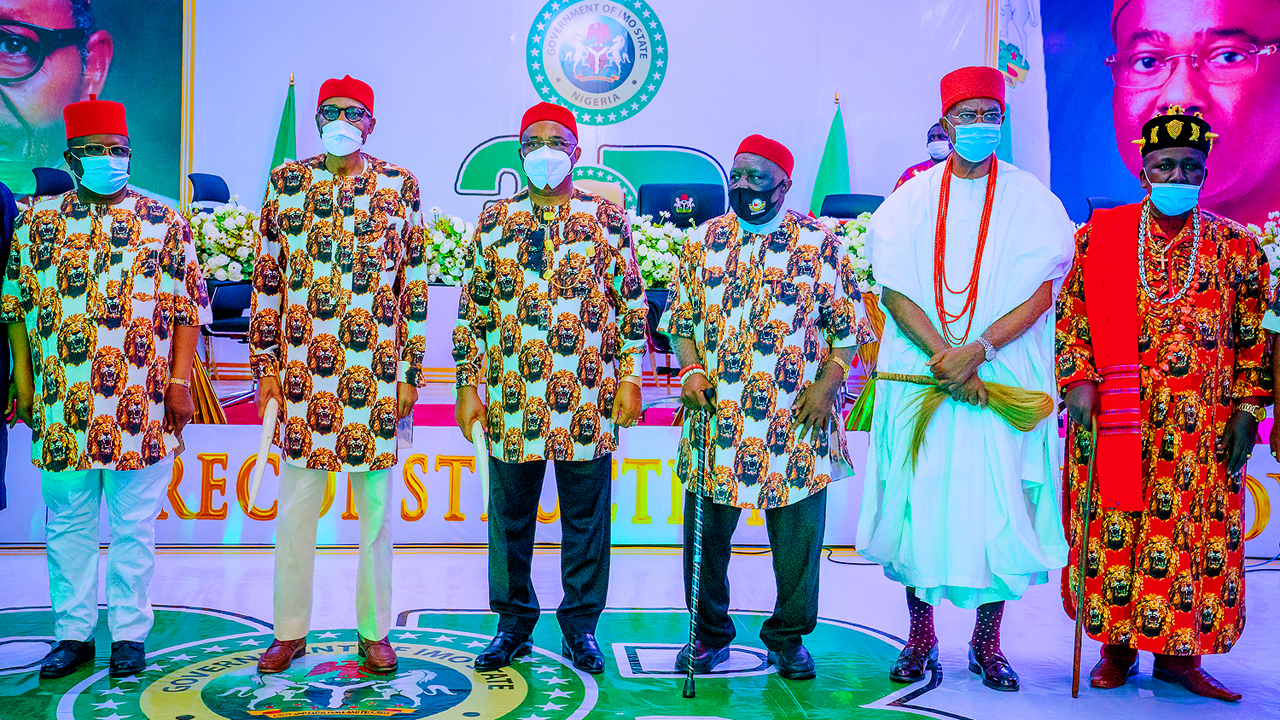We welcome Buhari’s visit to Imo but….
He promised that the federal government would complete ongoing key projects in the South East…

Buhari in Imo State
On Thursday, September 9, President Muhammadu Buhari paid a visit to Imo State amidst heavy security. The timing of the visit could not have been better, with parts of the South-East region restless over secession agitations and the president’s perceived unpopularity among the Igbo people of the region.
During the visit, the president announced new vistas of engagement with the region, praised the necessary political figures and promised improved security. He also held a town hall meeting with some leaders of the region where he had the chance to dialogue with these leaders.
- Unilorin murder case: Defence counsels accuse DSS of torturing suspects
- PODCAST: Real Reason Why Many Nigerians Refuse COVID-19 Vaccine
He promised that the federal government would complete ongoing key projects in the South East, including the 2nd Niger Bridge as well as the railway lines and routes linking the region with other parts of the country.
‘‘I firmly believe that when you get infrastructure right, Nigerians will mind their own businesses,’’ he said, adding that as a group, the Igbo stand to benefit more from the ongoing development of infrastructure in the country because ‘‘they are more enterprising.’’
The Governor of Imo State, Hope Uzodimma, earlier in his speech, urged the president to deal permanently with the issues of insecurity and flooding ravaging the state. He said the Ndigbo believe in a united Nigeria predicated on ‘‘justice, equity and fairness.’’
Considering the president’s rather fractious relationship with the region where he has perennially scored low votes in his five presidential election bids and his comments in recent interviews that have not helped smoothen things over, the president’s first visit to the South East in years was an opportunity to mend relations.
Since the president’s last visit to the region in November 2017, his relationship with the South-East has gone further South. Last time, four out of the five governors in the region received him during his visit to Ebonyi State, where he was conferred with two chieftaincy titles. This time, only two of five were in attendance. In the intervening years, secessionist agitations have increased, leading to attacks on police facilities that have left dozens of officers dead or injured. Hundreds of residents stayed at home during the visit following scaremongering and a “sit-at-home order” by the IPOB.
In these circumstances, Governor Hope Uzodimma of Imo State deserves credit for organising the visit, inviting the president and traditional rulers in the region to a town hall meeting. The president too should be commended for accepting the invitation and listening to the leaders of the region. It was clearly a visit designed to change perceptions on both the part of the president and the region.
Sadly, both the presidency and the South-East underutilised the opportunity to mend relations. Such a visit should have lasted longer than two days to have more direct engagement with the people of the region and perhaps should have extended to more states including those governed by opposition parties.
While the president made certain assurances of completing federal projects and improving security in the region in his brief address during the visit, he failed to address the fundamental causes of the agitations that have fueled secessionists’ agitations in the region.
But not only that the presidency missed the chance. Despite Governor Uzodimma’s success in bringing together traditional leaders to engage with the president, these leaders failed to agree on a definitive position to engage the president on. While some were content to thank him for some federal projects that were executed in the region, others wanted to demand more and have a more robust engagement with the president than what was allowed.
The delicate nature of the politics of the South-East deserves that the fears and misconceptions about the president’s feelings for the Igbos be addressed. The people of the region, who are being threatened by the menace of IPOB, who force people to shut down their businesses and disrupt their lawful social engagements should have been addressed with clear strategies towards a peaceful resolution of the crisis.
Despite the shortcomings of this visit, it is a step in the right direction and the president should embark on more outreaches to enhance national unity, allay unfounded fears and address social and political agitations across the country. This kind of visit will help to tackle agitations across the country if properly handled.
